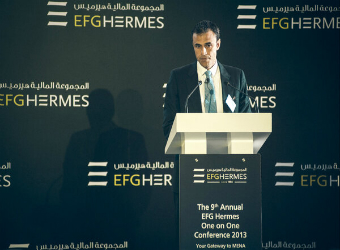EFG Hermes (HRHO.CA), Egypt’s largest investment bank, wants to secure 60 percent of its investment banking revenue from abroad by 2017, its group chief executive told Reuters on Monday.
Three years of political turmoil since the uprising that swept autocratic leader Hosni Mubarak from power have taken a heavy toll on Egypt’s economy, deterring foreign investment and tourism. Islamist President Mohamed Morsi was ousted last year following protests against his rule.
EFG, which has yet to report full-year 2013 earnings, has seen its annual profits slide sharply since 2011, when Mubarak was deposed.
The bank, which has operations across the Middle East, wants a better revenue balance, CEO Karim Awad said in an interview on the sidelines of a conference in Dubai on Monday.
Currently 60 percent of investment banking revenue comes from Egypt and 40 percent from abroad, but EFG wants to flip that round to 60 percent from overseas, he said.
“Egypt will continue to be a very crucial market for EFG Hermes but we want to make sure we have good operations in the United Arab Emirates, Saudi Arabia, Kuwait and other markets,” Awad said.
“The target is to become a more balanced regional bank that operates across all markets, with Egypt remaining the largest contributor,” he said, adding the bank was targeting growth in its asset management business, with its core brokerage operations also pushing it towards the overseas revenue target.
Awad said EFG’s mergers and acquisitions advisory pipeline was currently strongest in Saudi Arabia, with deals both inside the country and outbound transactions into other Middle East nations being worked on.
EFG Hermes reported a 63 percent drop in 2011 full-year net profit to 307.7 million Egyptian pounds ($44.2 million), compared with a year earlier, amid the country’s unrest.
The bank, which saw a merger deal with Qatari investment bank QInvest collapse in May last year, has aggressively cut costs since the tie-up failed. Awad said the bank expects operating expenses to fall to 780-800 million Egyptian pounds at the end of 2013 and to 500 million Egyptian pounds in 2014.
